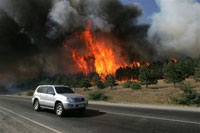Russia ready to end the war
Russia declared itself ready to make peace with Georgia, and U.N. officials confirmed Sunday that Georgia is prepared to negotiate with Russia by withdrawing its troops from the breakaway province of South Ossetia and creating a "safe travel" zone.

The U.N. Security Council met Sunday for the fourth time in as many days trying to resolve a conflict that began when U.S.-allied Georgia tried to control South Ossetia, then retreated in the face of Russia's tanks and aircraft.
Russia is "ready to put an end to the war," said Russian Ambassador Vitaly Churkin, who also accused the U.N. secretary-general's office of taking Georgia's side in the dispute.
However, Russia also has deployed a naval squadron off the coast of Abkhazia, another separatist region in Georgia, and its aircraft bombed the outskirts of Tbilisi, the Georgian capital.
Georgia's Foreign Ministry said its soldiers were observing a cease-fire on orders of the president and declared the move in a note handed over to Russia's envoy to Tbilisi.
"They're ready for immediate talks with the Russian Federation," confirmed U.N. Undersecretary-General for Political Affairs B. Lynne Pascoe during a briefing to the Security Council.
He said Georgia's "humanitarian corridor" for civilians, refugees and troops would help facilitate the negotiations.
Responding to Churkin's remarks, British Deputy Ambassador Karen Pierce defended U.N. Secretary-General Ban Ki-moon's office as impartial.
"An attack on the Secretariat is an attack on the institution," she said. "It does it no credit."
She questioned why Russia was not willing to agree to an immediate cease-fire, and called on Russia to use its influence in Abkhazia to control forces seeking to widen the conflict.
U.S. Ambassador Zalmay Khalilzad also accused Russia of resisting attempts to make peace.
Many of the council members side with Georgia, which is not a council member. Georgia's ambassador, who was present Sunday, can only join the council's open meetings, not its private talks, and then only by invitation.
But Russia is one of five nations with veto power on the 15-nation council. The others are Britain, China, France and the U.S.
"The time has come for us all to show our responsibility and to end a deteriorating process," said French Deputy Ambassador Jean-Pierre Lacroix, whose nation holds the European Union presidency for the rest of this year.
Subscribe to Pravda.Ru Telegram channel, Facebook, RSS!


